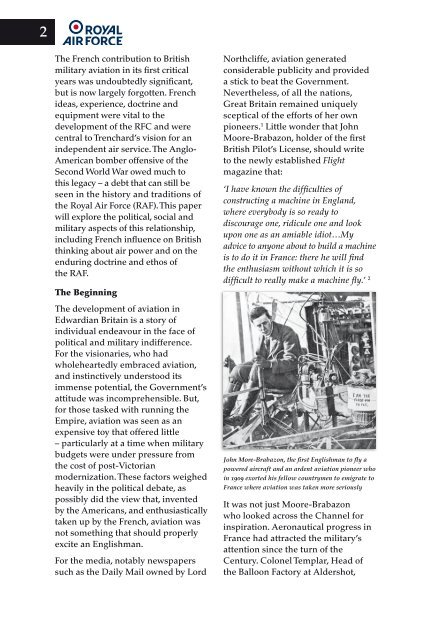Create successful ePaper yourself
Turn your PDF publications into a flip-book with our unique Google optimized e-Paper software.
2<br />
The French contribution to British<br />
military aviation in its fi rst critical<br />
years was undoubtedly signifi cant,<br />
but is now largely forgotten. French<br />
ideas, experience, doctrine and<br />
equipment were vital to the<br />
development of the RFC and were<br />
central to Trenchard’s vision for an<br />
independent air service. The Anglo-<br />
American bomber offensive of the<br />
Second World War owed much to<br />
this legacy – a debt that can still be<br />
seen in the history and traditions of<br />
the Royal <strong>Air</strong> Force (RAF). This paper<br />
will explore the political, social and<br />
military aspects of this relationship,<br />
including French infl uence on British<br />
thinking about air power and on the<br />
enduring doctrine and ethos of<br />
the RAF.<br />
The Beginning<br />
The development of aviation in<br />
Edwardian Britain is a story of<br />
individual endeavour in the face of<br />
political and military indifference.<br />
For the visionaries, who had<br />
wholeheartedly embraced aviation,<br />
and instinctively understood its<br />
immense potential, the Government’s<br />
attitude was incomprehensible. But,<br />
for those tasked with running the<br />
Empire, aviation was seen as an<br />
expensive toy that offered little<br />
– particularly at a time when military<br />
budgets were under pressure from<br />
the cost of post-Victorian<br />
modernization. These factors weighed<br />
heavily in the political debate, as<br />
possibly did the view that, invented<br />
by the Americans, and enthusiastically<br />
taken up by the French, aviation was<br />
not something that should properly<br />
excite an Englishman.<br />
For the media, notably newspapers<br />
such as the Daily Mail owned by Lord<br />
Northcliffe, aviation generated<br />
considerable publicity and provided<br />
a stick to beat the Government.<br />
Nevertheless, of all the nations,<br />
Great Britain remained uniquely<br />
sceptical of the efforts of her own<br />
pioneers. 1 Little wonder that John<br />
Moore-Brabazon, holder of the fi rst<br />
British Pilot’s License, should write<br />
to the newly established Flight<br />
magazine that:<br />
‘I have known the diffi culties of<br />
constructing a machine in England,<br />
where everybody is so ready to<br />
discourage one, ridicule one and look<br />
upon one as an amiable idiot…My<br />
advice to anyone about to build a machine<br />
is to do it in France: there he will fi nd<br />
the enthusiasm without which it is so<br />
diffi cult to really make a machine fl y.’ 2<br />
It was not just Moore-Brabazon<br />
who looked across the Channel for<br />
inspiration. Aeronautical progress in<br />
France had attracted the military’s<br />
attention since the turn of the<br />
Century. Colonel Templar, Head of<br />
the Balloon Factory at Aldershot,

















